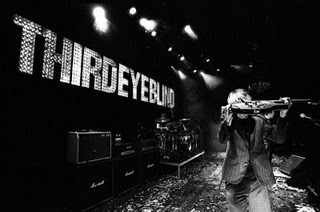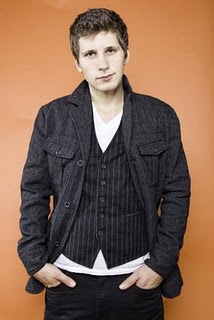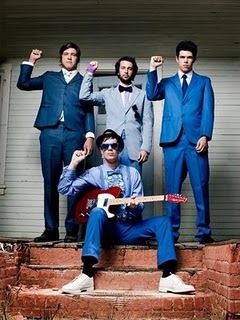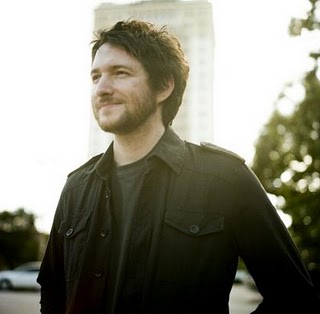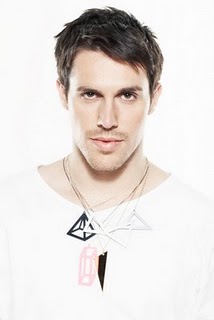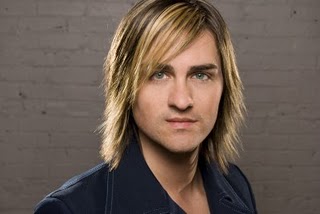 Strive has been compared to that of U2 and Switchfoot with their inspirational lyrics and The Fray with their piano pop-rock sound. You can hear a bit of Josh Groban in singer Derick Thompson’s vocals as well. Fire, Strive’s first global release, is a solid album, both lyrically and musically. First single “Smallest Things,” has already been gaining much attention globally while four additional songs from the album have been licensed for various MTV and E! shows.
Strive has been compared to that of U2 and Switchfoot with their inspirational lyrics and The Fray with their piano pop-rock sound. You can hear a bit of Josh Groban in singer Derick Thompson’s vocals as well. Fire, Strive’s first global release, is a solid album, both lyrically and musically. First single “Smallest Things,” has already been gaining much attention globally while four additional songs from the album have been licensed for various MTV and E! shows.
Derick was nice enough to chat with me just a week after the release of Fire. He filled me in on how the band began, their global efforts on teaching AIDS awareness through rock concerts throughout Russia as well as the meaning behind many of their songs. While they won’t be touring for some time, they welcome fans to check out their songs and chat with them on their Website.
To listen to Derick talk about the history of the band, their music and latest album, Fire, click here. To learn more about the music writing process, being ranked No. 14 on CCM’s top 100 artists and a very personal, in-depth description of his favorite song on the album, listen here and feel free to read the full Q&A; below.
How did Strive get started?
Strive started back in 2000. It originated from a few bands I’d been in high school and wanted to carry on into my college experience. So I showed up at Wheaton College in 2000, met some other musicians and decided that we should form a band and called is Strive. That was the initiation. We played a lot of shows around the Chicago area where Wheaton is during our years there. During our junior year we took Strive to Russia on a tour to do AIDS awareness rock concerts where we went into clubs and schools and festivals and talked about AIDS education, basically the facts about the disease, HIV and AIDS.
That stemmed out of Bono visiting Wheaton College on his “Heart of America” tour talking about Africa. That spurred us to want to get involved in the crisis globally. I grew up in Russia and had contacts there so we decided to go to Russia instead of Africa to get in before it turned into the situation that’s happened in Africa. That was pretty monumental for the band; as far as just gelling it together and making us feel like this is something that we feel really called to and that we can have an impact, not just with the music, but with what we were able to do with people who love God and love giving back, and trying to make the world a better place for everybody.
It’s definitely something that forms who we are as a group, just the way I approach songwriting and the band in general, because we’ve had the experience of going through a great education and developing a global perspective. For me specifically, I grew up overseas, I spent five years in Russia as a kid in my teen years, which definitely formed who I was. To bring more of an immigrated faith and learning perspective to that, and then to meet like minded people was a huge opportunity and definitely was the basis for where Strive has developed and gone.
You said your international experience had a big impact on your writing; did this influence your latest album Fire?
It did. [Fire] has this general, more social minded [impact] than some of the stuff we’ve done in the past. We’ve done five full-length records and a few EP’s. Then we went through this phase where we did this rock opera on life of Christ and geared everything around Christ and spiritual stuff and realized we were limiting ourselves. We wrote that project to bring Christ to people who hadn’t heard about him and we realized we were pigeonholing ourselves from reaching that demographic because it was so overtly Christian that it wasn’t even given a chance. We were reaching the church, which was great, but it wasn’t what we felt called to do. That transition happened in 2005, when we went to Brazil on tour with that project. We realized we were having a much larger impact playing other songs than just being an American rock band in this non-profit that was doing a project on the life of Christ.
The stuff that spun out of that was this desire to write an album like Fire, that talked of things like, what does it mean to live a life in the knowledge that God saved you or that he created the world for us? And that he gave us things like sunrises and coffee with friends. The concepts like that spun out the song, “Smallest Things,” which is our first single off the record. That is just reminding ourselves that we have so many great things in our lives and ultimately we’re called to, because of that, share it with others and love other people and serve them. That is a set theme throughout the record. After eight years of being together and writing a lot of songs and seeing a lot of things, I really feel like this album best articulates where I’ve been personally, by God and the circumstances. It definitely has that gear to it.
I know you’ve been compared to Switchfoot and The Fray with your piano playing and U2 with the positive messages. How would you describe your music?
I would say its melodic, piano, pop-rock. In general, it’s just authentic music that to us, is what we like to listen to and hear. The lyrical content and the melodies we choose are very positive and bright for the most part. So when people listen to us I think they’ll walk away feeling uplifted or positive about something or they’ll take away a thought, like, “I really hadn’t looked at life that way before.” But, in that, whether it’s somebody who has a spiritual background in the church or an atheist, they can communicate on that level. There are some simple truths that run through the world and just the way things work. I think everyone can feel love and appreciate nature and beauty and grace and salvation, regardless of where they find it.
We hope that the music speaks, that it’s evident to people that there is something more to who we are. I feel like as people search and discover more who Strive is and get to know myself and the other people that are involved with us that Christ’s name will be great through what we’ve done, even though it’s not worship music. It’s not like, “God saved you.” We definitely get, “Why isn’t there more spiritual, overt lyrics about Christ saves you?” my response is that Christ came and he told stories; he didn’t beat people over the head with a stick. He was more eloquent and graceful; he was an artist, he was a poet, he was a storyteller. When I embody Christ the best in my music, that’s when I’m reflecting in the songs that I’m writing, seeing the world through his eyes and through the relationship I have with him.
Your lyrics are very positive and uplifting and the music industry today doesn’t always embrace that. How are you hoping to stick around and make that impact into the music industry?
Well, because we
decided on the front end of this disc with our partnership with GoDigital Records that we were going to, right from the start, be in both spheres — CCM and mainstream — we’ve been able to do that pretty effectively. We’re getting spun on Christian stations and mainstream stations. There really isn’t going to be a crossover for Strive, I feel like we already are a crossover. It helps that we never had huge success in either realm; it was more on the indie plane with our previous discs so there’s not as much, “This is who Strive is, now they’re reinventing themselves.” It’s more like, this is the first entry into the more commercialized realm of the music industry.
Your current single, “Smallest Things,” has been downloaded all over the world. Did you ever imagine it having so much success?
We worked really, really hard to develop indie marketing tools, so that was one of the reasons we were identified by GoDigital Records, because we were doing it all ourselves. I had been working for a company that does Internet marketing and that kind of built a platform to market Strive on this Internet platform and it worked really well to deliver the music to radio stations and other media around the world. Basically, we added some extra momentum to that with GoDigital and then pushed out the new single through the strategy that I developed before for Strive and it came back five times as successful thus far, and that’s just the beginning. I thought it was going to work really well. It’s not a surprise, as to what’s happening initially because we’re doing it very intentionally, as far as getting it out at the grassroots level of radio and media instead of just taking it to only the main watering hole. We’re bringing it to the door via email and other Internet communication tools.
Do you have a favorite song that you’ve written, or one that’s stuck out as being more meaningful to you?
Well, I feel like the title track for the album, “Fire,” is a pretty strong song conceptually and lyrically for the disc. It’s kind of the under theme of love for the whole album. There are a lot of songs that deal with love, specifically for this disc, a lot of those songs come out of the relationship that I have with my wife who I met when we were on tour for the first time in Brazil. A lot of emotion comes out when you first get married and in your relationship. There are some different concepts and perspectives about what I’ve learned about love and I felt like this album is a great way to communicate that. I think for society in general, what better way to connect with people then talking about relationships? Because everybody has them in one way or another.
When I wrote this song, which basically talks about the way sex should be in marriage — the way I feel like God as the creator intended it to be — there was some initial reaction from my circle of friends and family saying, “I don’t know if you should be singing about that.” There’s nothing overtly sexual about the song. It talks about having intimacy and creating the mood to experience the joy of sex. To me, this song is my effort to paint a picture for culture in general and we wrote it so that it would be pushed into the mainstream. It’s our fourth single, so to say, “It’s cool and its right and sex is better in the context of marriage where it was created to be shared.” Instead of the cultural thing, which says, “Good sex is meeting a stranger and having sex with them or premarital sex with boyfriends or girlfriends.” I think for the church, people that are married and agree with that sentiment, it’s kind of a reminder to them that sex is what makes a marriage strong. And that we have to place importance and speak honestly about things like, “Yeah, you should love your wife and your husband and you should share your gift of sex with them.”
I think the other angle that the song talks about is, not to promote abstinence, but to reinforce the concept for kids and people who are looking at sex. That even rock bands and people that are maybe capable of misusing and abusing sex that it is actually cooler and more right to wait for marriage and find somebody that you want to spend your life with to share that with because it’s going to be better. I can speak honestly; I had sex before marriage so I’m not this naïve kid that is like, “Well sex is so much better when you’re married.” I had it in both spheres. So, I understand both sides of it and I can honestly say, not being on a soap box trying to push an agenda, it’s just better. I feel like, as a believer, I need to use the life experiences that I have in every area to communicate truth. I hope this album, and that song in particular talks to that.
A lot of songs you get to know the songwriter. Do you ever hold back because it’s too personal?
My songwriting process is, normally I’ll sit down and the music will spill out of me. Usually it only takes a half an hour to hour to write the music for a song. I feel it’s an inspired act for me. Normally I have an idea about what I want to write about. I’ll record the music and then just start writing lyrics. In general, it comes together authentically. To me, there needs to be some rhyme and good form for the track, but I don’t really think through, “Is this going to be too personal for me,” or “Is this going to share something” or even try to be overtly, “I want them to take this away from song.” Instead, I try to be a conduit to my experience and to show the gift that God has given to me. It’s not me manufacturing, but more me communicating the truth. That’s the way I write, not thinking it through too much.
I find a lot of inspiration in reading, literature, stories, and things like that. If you look at the song, “Fire” that’s kind of a painting of Adam and Eve’s first night together. There’s a lyric in there, “I was taken, you were taken,” conceptualizing in the biblical story, he was taken out of man. I think people who have read the same things I have, especially scripture, they’ll see a lot of, maybe it’s not overtly Christian stuff, but the concepts that are there and some of the nuances of lyrics, I’m falling back on a lot of theological and spiritual truth that I have from my upbringing and studying and life experience.
Your song “On Our Way” seems like there is so much meaning behind it. I know you said it was sparked by a conversation you had with a friend. What were you thinking when writing it?
I have a really close friend, Rich from Zimbabwe, and he went to Wheaton and was actually part of the band at different points as the bassist. He and I, originally when Bono came to Wheaton’s campus, we talked about going to Zimbabwe and then it transpired for us to go to Russia instead. The thought has always been, in the band, that we should keep it close to our hearts that we need to be doing something in Africa, at least use it as an example to keep us accountable for compassion and realizing that the world goes far beyond our little suburbs here in Chicago. “On Our Way” was the peak of the conversation where he’s considering going back to Africa to be part of some social issues. His father works for USAID over there so we have a lot of information coming in. We were talking about how sometimes the Western world approaches countries that needs assistance as a benevolent dictator almost. As a rich person that says, “I can help you, but here are the strings you have to jump through and then pay it back.” Sometimes we’ll come along as brothers and sisters that say, “We’re not so different. You’re facing things that are difficult, we are too. It might look different, but ultimately we are the same.”
“On Our Way” talks about that second approach, which says, “Together we can do something
.” The change that happens with that interaction is much more lasting and impactful because both sides have a big buy in and both sides benefit from it tremendously. That’s what Strive has committed to as a band and that’s what we did in Russia. We have some plans, once Rich gets over there, to do a long-term partnership with him in Zimbabwe, hopefully if the political situation settles down a little bit, if he can even get into his country. At this point he can’t even go back. That’s what that song is about for Africa, but really for the whole world.
You’ve accomplished so much as an independent band. You were ranked No. 14 on CCM’s top 100 artists. How did that come about?
I don’t know honestly about that ranking. I feel like we had a pretty strong presence on their MyCCM site, when it first started and they featured us and some of the editors really liked us, I guess. That was right when we had recorded the EP that got us signed to GoDigital. We had started some Internet marketing. I feel like Strive, because it hasn’t been a big name, we’re kind of like that guy in the back room that has a lot of potential, but hasn’t been in the spotlight yet. A few people in the industry still look for those kinds of bands. I think that’s probably how we made it on that list. GoDigital is definitely a visionary as far as identifying some unique artists and strategies to sell music. Our publicist, Rick Hoganson, he is too, just being willing to jump on our project and be part of what we do. We just have a great team and it’s awesome that that’s happening and will continue to happen I think.
What’s your advice to upcoming independent bands? What have you learned?
If you look at most of the successful bands that are out there, it could take, easy 10 years to get into the main core of your career. So you better have some other things that you’re doing, while you’re doing your music because it’s not like it’s easy to be an independent artist or a major artist for that matter at the moment. There is not as much money coming in through record sales, but there are other revenue streams, marketing, advertising, things like that that bands can tap into.
For me, right now, even with what we’re doing, I’m part of church plant that’s happening in the Chicago area as the creative arts pastor. I’m doing that full time alongside with what I’m doing with Strive. To me, I have new inspiration for songs; I’m more creative when I am doing the stuff for Strive, I have more relationships and connections, there’s more depth to just seeing things and understanding. And then there’s accountability. I think all those elements are really important for independent artists and new artists, just to continually live life. Don’t fit into a bubble, that “This is all that matters to me. If I only focus on this, then I’ll be successful” because that’s not normally how it happens. If you’re anything like me, it’ll drive you insane just to have that to focus on. We love to be doing our art and if you’re not making any money doing it and you’re working a dead-end job, life can just stand still and it’ll pass you by if it never happens big time for you.
Do you have a favorite place you’ve played?
Brazil is definitely the best place to play. Just in general, I’m in love with Brazil as a country; it’s beautiful, the people are authentic and friendly and loving and interesting as a culture and a society, it’s progressing extremely fast. Their taste for music is constantly expanding. We just found when we were there, they resonated with us and we resonated with them. I’ve been able to learn Brazilian Portuguese fairly well. I think long-term; Brazil is a place that Strive will tour a ton in because we see the opportunity for a major impact, not just socially but spiritually as well. It’s just an opportunity to live an authentic, Christ-like life down there.
What do you feel makes Strive different from other bands out there?
I think the unique aspect of Strive is who I am, what my life experience is, how I’m able to communicate that through the medium of music and songwriting and performance and art in general. That is what makes every band unique, the people that make it up. Will Puth is the lead guitarist for Strive. He is just a really dynamic, spiritual and mature guy. He has an interaction of our music and what he’s able to bring, he’s the other main creative element to our sound. I feel like when that happens between individuals, specifically in Strive, makes us who we are. It’s not so much that we’re not better than this other band or not. I feel that we’re unique and people will either resonate with that and resonate with the lyrics and the melodies that come from my heart and my mouth or they won’t. That’s how I like to look at things and encourage people to give us a chance. You’ll either love it or not love it and either is fine, but we appreciate having the opportunity to reach listeners.
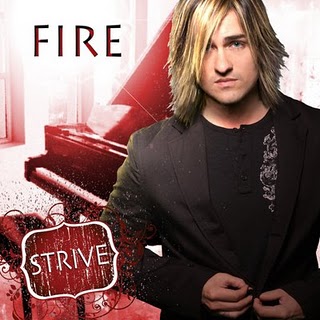 For more on Strive, be sure to check out their Website.
For more on Strive, be sure to check out their Website.
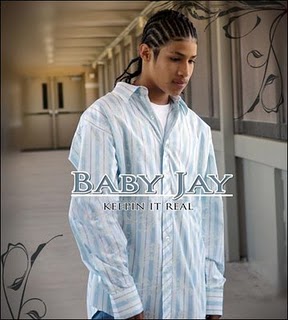 Last year Tammy, my friend and editor of Misquincemag.com, was launching a Web site that focused on teens and preparing for their quinceañera. She asked if I’d be willing to help out and interview a 16-year-old rapper who has been making a major impact in the rap world. Truly an inspiration to others, I couldn’t say no! Read below for my interview with Baby Jay.
Last year Tammy, my friend and editor of Misquincemag.com, was launching a Web site that focused on teens and preparing for their quinceañera. She asked if I’d be willing to help out and interview a 16-year-old rapper who has been making a major impact in the rap world. Truly an inspiration to others, I couldn’t say no! Read below for my interview with Baby Jay.